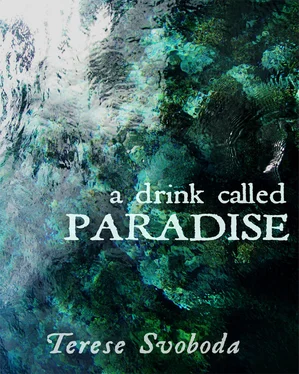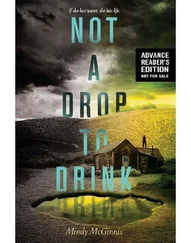I’m sorry, I say.
He turns off a radio behind him. You’re what?
I never told you I was sorry.
That’s true, he says. He was my son too.
Tell your wife I said so, I say.
He sighs and starts to say something, but his voice breaks.
What is it?
It’s okay, he says. I forgive you.
I hold the phone and hold it tighter. It wasn’t my fault, I say. It was an accident.
I forgive you, he says again.
I can’t say anything.
So where are you? he asks. I called you about his savings account, but your office said you were gone.
On a boat, I say. A very strange boat, and I’m hoping it will get me to an airport. Please call my office and tell them I’ll be back in a week.
There’s silence on his side, an echo of silence. You still only care about work.
No — no. That never was true. You know that.
What? he says. I can’t hear you.
Listen, I say, the name of the boat is — what? She told me. I lean from the booth, but she’s not around to ask and there’s no sign. It isn’t about work, I say. Really. Tell them that on I’m this boat—
The echo girls have stopped. The echo girls sit back on their haunches and pick their teeth, bored with the actual transmission of information, and in a second I hear nothing at all from the other end, not even the insect swishing of static, of the electric wave tumbling. I say, It isn’t about work at all — but the phone is already dead.
I hit the phone. I hit it again because it doesn’t hurt enough the first time. I manage with number two to put myself in pain. I’m in pain, I’m in pain.
The man who lectures me, who says, That’s private property, ma’am, which I understand to mean I am private property, me, the one who’s in pain and hurt, not the jackass plastic, that I shouldn’t be misused, that man is, say, six years older than my son was, the size my son would have been in six short years, and this baby tells me it’s the only call I can make for three days and by that time we’ll be in port anyway, so relax. We can’t have everyone hanging on the line, he says, and maybe he pats the sucker or maybe he doesn’t, but the gesture is what boys learn with machines they love instead of women. He doesn’t, however, catch the way my face shifts in anger. He says, What about dinner, have you had it?
I do smell its grease, the kind that hamburger makes. After all those boiled roots and puddings, that vast pig, and those tins of fat and fish and salt and wet leather, this smell has its virtues, starting with the smell of home. Home fries, I hear him say as he herds me away from that phone. I hold my hurt hand that is all I have to remember of what I said, I wind down corridor after corridor, the smell stronger than the antiseptic, then the smell is there and the rest folds behind into memory in the presence of clicking plastic silver.
We walk in front of Day-Glo French dressing spread across equally bright greens, instant potatoes wallpaper-paste-fine topped with brown, a color that advertises a circle of meat somewhere below, ground from the tubes and ears of various short-lived creatures, all of which the server plops onto my plate in an almost musical series.
This boy I have come with touches me on the elbow to guide me past the plastic tree strung with red and gold bits of sprayed food — popcorn, macaroni, old bones? — to where the other hot ones eat. That’s where he thinks I want to sit. But I have to know more than what is stamped on the faces of the left-behind islanders, the six who now, removed from the island, removed from their clothes, show their necklaces and scars above their gray wraps, their faces flat with what’s been given them.
I say, Sit with me, it’s been a long time since I talked to someone from home, and I see him squirm and it’s all there: my exposure writ in his body’s flinch, the eyes’ denial that I’m a person standing in front of him, but enough like his mother that a sense of the filial lies in the way of total trashing. If only he had a video game to hide behind.
He’s got his orders, he sits me at another table. But he agrees to sit nearby, he’ll chat with me.
We talk islands and music and their music, as if they can’t talk about their own music. But they don’t want to talk about their music — or anything. The islanders barely eat. Their tests are just beginning, tests they can’t pass, I am thinking, the only tests they can get. Ngarima sits in front of her food, coughing, with a look on her face that I have seen in the snapshots Temu found, a look that says, Who could eat?
Do you get to drink on board? I ask. I’m trying to sound as if I am his age or I once was and did a lot of drinking and maybe drugs too, but of course it fails. I forget my face and how surely it’s hardened from a different past than his, and he gobbles another fearsome bite of his quarter-pounder with fries and says tonight is their party, it’s a week early, they’ve got to get to the next island and the water is rough, so there won’t be much drinking.
I fork through my meat and turn it over. What else? I suppose you’ve seen a lot of water, I say, you’ve probably surfed in a lot of incredible places.
He says, Yes. He brightens. Lots. And most of them look like this one, he says. He names an archipelago or two of even more far-flung islands, says the sharks are bad on some of them, but then, they glow in the dark, why worry?
He stops because his food is almost gone, because I’m staring at him, because he should. He laughs. Glow in the dark, he repeats, shaking his head at his own joke.
What if I don’t test out?
Well, they’ll give you a few more tests, and maybe some treatment. It’s not that you want to be in any hurry not to take the tests. But don’t worry, you were hardly exposed at all. Not like them. He points the chewed end of his red meat to where they sit as if they are already dead, not eating.
Where do you put the trash? I ask.
He points to a hole next to the serving area. I push in all of the brightly colored foods so they tumble into the dark that trash makes, and Ngarima comes up to me.
Don’t sleep, she says. Ghosts will get you when you sleep. She looks as if she has locked her eyes again, the way you do on the island to sleep in the day.
Stars in absolute excess, I gulp stars in my breathlessness, swinging through the last door off the stairs that finally lead up and out, and she is sitting on the cold metal deck, her legs drawn up, her eyes on the smoke that curls but does not drift into the stillness of the star-packed air. She is a civilian now, or at least the lab coat’s gone, her clipboard’s stowed — nothing she holds protects her. She jerks her cup back toward her toes, away from me.
Not that I threaten her, not that I come toe to toe. I am bathing in stars. We sit in absolute dark here, an aurora borealis in reverse, black paint sucking the stars closer than even the stars on the island, which will surely someday set fire to the tops of the palms, fronds waving once too often against their white light.
’Tis the season. She offers me a shot, which I take. And I take a second one, and one more before she says it’s not her bottle.
As many islands as there are stars, I say, toasting her. You like working for this corporation?
She levers herself up from the deck, weaving a little, smoothing her way forward with her feet. They give you a house at the facility, it’s okay, she says. It’s a very modern place.
It must be hard. I stand too.
A lot of medicine is hard. I try not to think about it.
I’m good at that.
We talk, and the dark starts to spin with words, which I try to hold on to. I ask what I need to ask, Are you the one in charge?
Читать дальше












